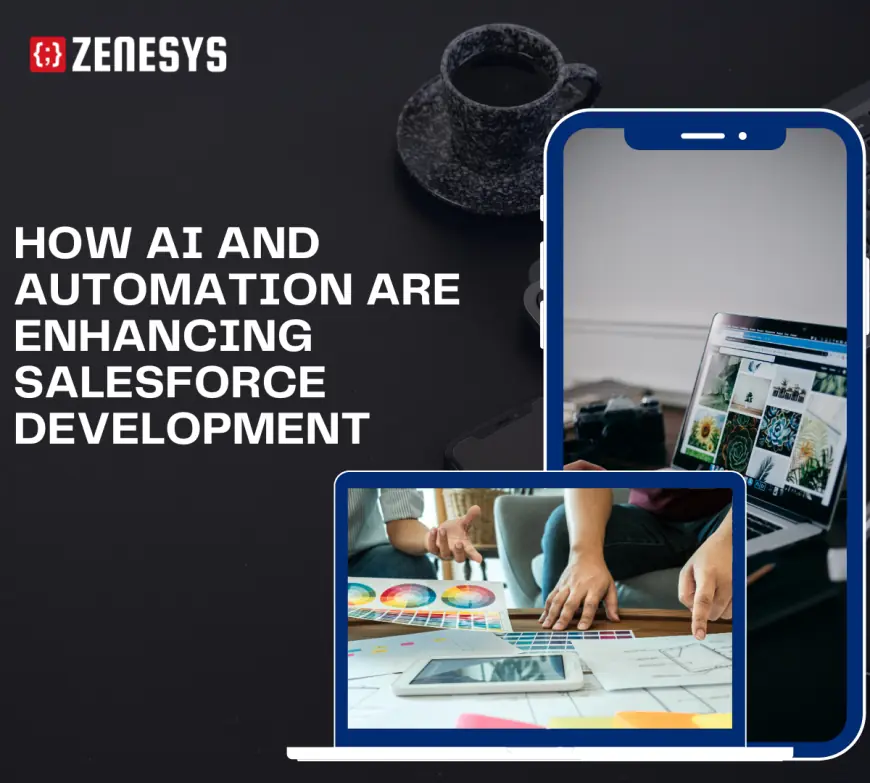How AI and Automation Are Enhancing Salesforce Development
Boost your Salesforce experience with AI and automation. Learn how smarter data management, automation, and personalized interactions are transforming Salesforce development.

Salesforce has been a go-to tool for businesses looking to manage customer relationships, track sales, and improve overall efficiency. But with AI and automation stepping in, things are moving faster and becoming even more efficient. Companies are now able to process data, predict customer behavior, and automate mundane tasks with much less effort.
A 2023 study by McKinsey found that AI-driven automation could boost productivity in CRM software by up to 40%. That’s a massive shift. And if you’ve ever been stuck manually updating customer records, you know just how much of a relief that can be.
Smarter Data Management
One of the biggest headaches in Salesforce development is handling large amounts of data. AI can help clean, organize, and analyze this data so businesses can make informed decisions without wasting time.
For example, AI-powered tools can automatically detect duplicate records, fill in missing information, and even predict which leads are most likely to convert. That means sales teams don’t have to waste time chasing cold leads or fixing errors manually.
Take Einstein AI, Salesforce’s own intelligence layer. It analyzes customer interactions and suggests the next best action for sales reps. No more guessing what a client needs next—AI figures it out for you.
Faster and More Accurate Automation
Automation is nothing new, but AI takes it to another level. Think of it as moving from basic autopilot to a self-driving car. Instead of just automating repetitive tasks, AI can actually adapt and improve workflows over time.
For instance, chatbots powered by AI can handle customer inquiries, process orders, and even schedule follow-ups—all without human intervention. This not only saves time but also ensures customers get responses quickly.
Another great example is lead scoring. Instead of a sales rep manually reviewing each prospect, AI can analyze behavior patterns and assign scores based on their likelihood to convert. Sales teams can then focus on the most promising leads instead of spreading themselves thin.
Personalized Customer Interactions
Customers expect personalized experiences, and AI makes that easier than ever. Instead of generic emails or robotic interactions, businesses can use AI to tailor their messages based on customer history, preferences, and behaviors.
A good example? AI can analyze past purchases and browsing habits to recommend products or services a customer is likely to be interested in. It’s like having a personal shopping assistant but on a much larger scale.
Marketing automation also benefits from AI. Tools can segment audiences more effectively, send emails at optimal times, and even generate personalized content based on what a customer is most likely to engage with.
Reducing Human Error
Even the most experienced professionals make mistakes. But AI and automation can reduce errors that come from manual data entry, miscommunications, or oversight.
For example, an AI-driven system can flag discrepancies in sales reports before they cause issues. Or it can automatically update customer information across different platforms to avoid inconsistencies.
Let’s say a customer changes their email address. Instead of manually updating that information across multiple systems, AI can detect the change and update it everywhere instantly. It’s a simple fix that prevents bigger problems down the line.
Boosting Developer Productivity
Salesforce developers also benefit from AI and automation. Instead of spending hours debugging code or testing features, AI-powered tools can do much of the heavy lifting.
For instance, AI can analyze code for potential bugs, suggest improvements, and even generate test cases. This means fewer late nights fixing errors and more time spent on building new features.
Low-code and no-code AI tools are also making development more accessible. Business users with little coding experience can now create custom workflows and automation processes without relying entirely on developers.
A More Efficient Salesforce Experience
The combination of AI and automation doesn’t just make Salesforce development easier—it makes it smarter. Businesses can spend less time on manual tasks and more time on strategy, innovation, and growth.
And if you’re looking for expert Salesforce development services, Zenesys offers end-to-end solutions. They provide everything from custom Salesforce development to automation, ensuring businesses get the most out of their CRM system.
Final Thoughts
AI and automation are transforming how businesses use Salesforce. From data management to customer interactions, these technologies make things faster, smarter, and more efficient. Whether you’re a sales rep, a developer, or a business owner, embracing AI in Salesforce development can make a world of difference.
As AI continues to evolve, we’re only scratching the surface of what’s possible. One thing is clear—businesses that adapt will have a major advantage.












